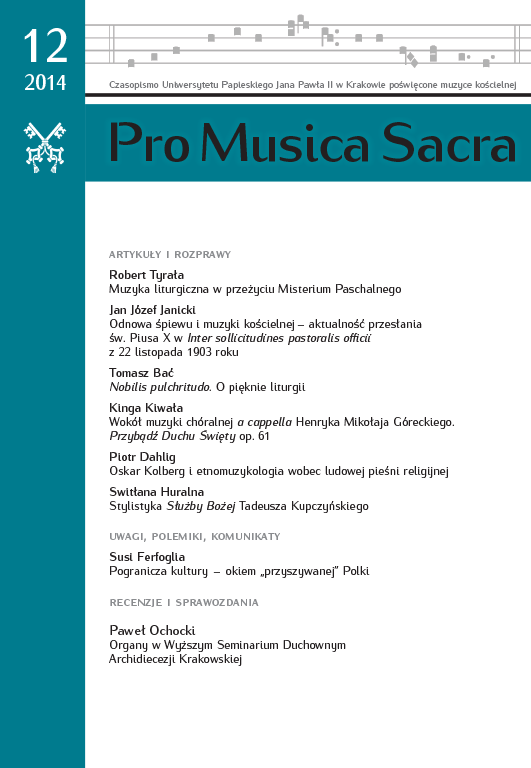Odnowa śpiewu i muzyki kościelnej – aktualność przesłania św. Piusa X w Inter sollicitudines pastoralis officii z 22 listopada 1903 roku
DOI:
https://doi.org/10.15633/pms.1512Słowa kluczowe:
Św. Pius X, śpiew w liturgii, muzyka kościelna, śpiew gregoriański, śpiew i muzyka świecka w liturgii, niewłaściwa muzyka kościelnaAbstrakt
Pośród różnych działań mających na celu odnowę życia chrześcijańskiego podejmowanych przez Kościół w XIX i na początku wieku XX odnowa liturgii zaczęła najbardziej wzbogacać jego życie religijne. W liturgii zaczęto na nowo dostrzegać istotę życia chrześcijańskiego i w niej szukano jego odnowy; „nie tylko nowymi środkami oddziaływania”, ale nadając życiu Kościoła „wyraz tak potrzebnej powagi i dostojeństwa”.
Pierwszą i najbardziej autorytatywną osobą pokazującą liturgię jako źródło życia duchowego dla każdego chrześcijanina, a nie tylko dla niewielkich „wybranych” grup wiernych, stał się papież Pius X, „pasterz dusz”, który programem swojej posługi apostolskiej uczynił hasło: Instaurare omnia in Christo. Papież Pius X, podejmując się realizacji swego programu „odnowienia wszystkiego w Chrystusie” w dziedzinie liturgii, skoncentrował swe działania przede wszystkim na odnowie śpiewu i muzyki liturgicznej (motu proprio Inter sollicitudines pastoralis officii – Tra le sollicitudini). Dokument ten został opublikowany 22 listopada 1903 w liturgiczne wspomnienie św. Cecylii, dziewicy i męczennicy, patronki muzyki kościelnej. Święta Kongregacja Obrzędów dekretem z dnia 8 stycznia 1904 roku ogłosiła ten papieski dokument „prawomocną ustawą o muzyce kościelnej”.
Ojciec święty Pius X w motu proprio z dnia 22 listopada 1903 roku wydanym w formie instrukcji o muzyce kościelnej (Instructio de musica sacra), przywrócił szczęśliwie czcigodny śpiew gregoriański, według ksiąg starożytnych, do pierwotnego użycia w kościołach i zarazem w jedną całość zebrał główne przepisy, mające na celu pomnożenie lub przywrócenie w świątyniach świętości i godności śpiewów, rozkazując z mocy pełności Apostolskiej swej Władzy, aby ten zbiór jako kodeks prawomocny muzyki kościelnej miał obowiązującą siłę prawa.
Ojciec święty Pius X zaraz na początku swego pontyfikatu skierował do całego Kościoła powszechnego stosunkowo obszerną i poniekąd surową instrukcję o śpiewie i muzyce kościelnej. Był bowiem przekonany, że wymaga tego zaistniała sytuacja nadużyć w tej dziedzinie życia Kościoła.
Bibliografia
Aubert R., Das Reformwerk Pius’X. Eucharistische Dekrete und liturgische Erneuerung, [w:] H. Jedin, Die Kirche in der Gegenwart, VI/2. Die Kirche zwischen Anpassung und Widerstand, Freiburg 1985, s. 416–426.
Aubert R., Kościół katolicki od kryzysu 1848 roku do pierwszej wojny światowej, [w:] Historia Kościoła, t. 5, 1848 do czasów współczesnych, red. L. J. Rogier, R. Aubert, M. D. Knowles, przeł. T. Szafrański, Warszawa 1985.
Banaszak M., Historia Kościoła Katolickiego, t. 3. Czasy nowożytne 1758–1914, Warszawa 1991.
Beauduin L., Modlitwa Kościoła, przekł. i wprow. S. Koperek, Kraków 1987.
Haquin A., Les décrets eucharistiques de Pie X. Entre mouvement eucharistique et mouvement liturgique, “La Maison Dieu” 203 (1995), s. 61–82.
Janicki J. J., „Instaurare omnia in Christo” papieża św. Piusa X (1903–1914) – a odnowa liturgiczna, „Folia Historica Cracoviensia” 10 (2004), s. 167–181.
Janicki J. J., Święty Pius X (1903–1914) – papież Eucharystii, „Kieleckie Studia Teologiczne” 10 (2011), s. 191–213.
Jougan A., Słownik kościelny łacińsko-polski, Poznań 1958.
Kunzler M., Liturgia Kościoła, przekł. i oprac. L. Balter, Poznań 1999.
Mizgalski G., Pius X, [w:] Mizgalski G., Podręczna encyklopedia muzyki kościelnej, Poznań 1959, s. 378–379.
Neunheuser B., Sto lat ruchu odnowy liturgicznej zapoczątkowanej przez o. Prospera Guéranger.
Przeszłość i perspektywy, „Ruch Biblijny i Liturgiczny” 29 (1976), s. 195–207.
Righetti M., Storia l.iturgica, t. 1, Introduzione generale, Milano 19643.
Rousseau O., Storia del movimento liturgico, Roma 1961.
Suñol G. M., Zasady śpiewu gregoriańskiego, tłum. M. Koziura, Poznań 1957.
Urban J., Relacja kard. Jana Puzyny o konklawe 1903 r. i o jego słynnym weto, „Folia Historica Cracoviensia” 8 (2002), s. 273–276.
Zieliński Z., Papiestwo i papieże dwóch ostatnich wieków, cz. 2, Poznań 1986.
Pobrania
Opublikowane
Numer
Dział
Licencja
Autorzy publikujący w czasopiśmie udzielają jego wydawcy zgody o następującej treści:
- Autor zachowuje autorskie prawa majątkowe do utworu, a jednocześnie udziela wydawcy czasopisma zgody na jego pierwszą publikację w wersji drukowanej i wersji online na licencji Creative Commons Uznanie autorstwa 4.0 Międzynarodowe oraz zgody na wykonywanie opracowań, w tym przekładów.
- Autor ma możliwość udzielania zgody niewyłącznej na opublikowanie utworu w wersji, która ukazała się w czasopiśmie (np. zamieszczenia go w repozytorium instytucjonalnym lub opublikowania w książce), wraz z informacją o jego pierwszej publikacji w czasopiśmie.
- Autor może umieścić swój utwór online (np. w repozytorium instytucjonalnym lub na swojej stronie internetowej) jeszcze przed zgłoszeniem utworu do czasopisma.

